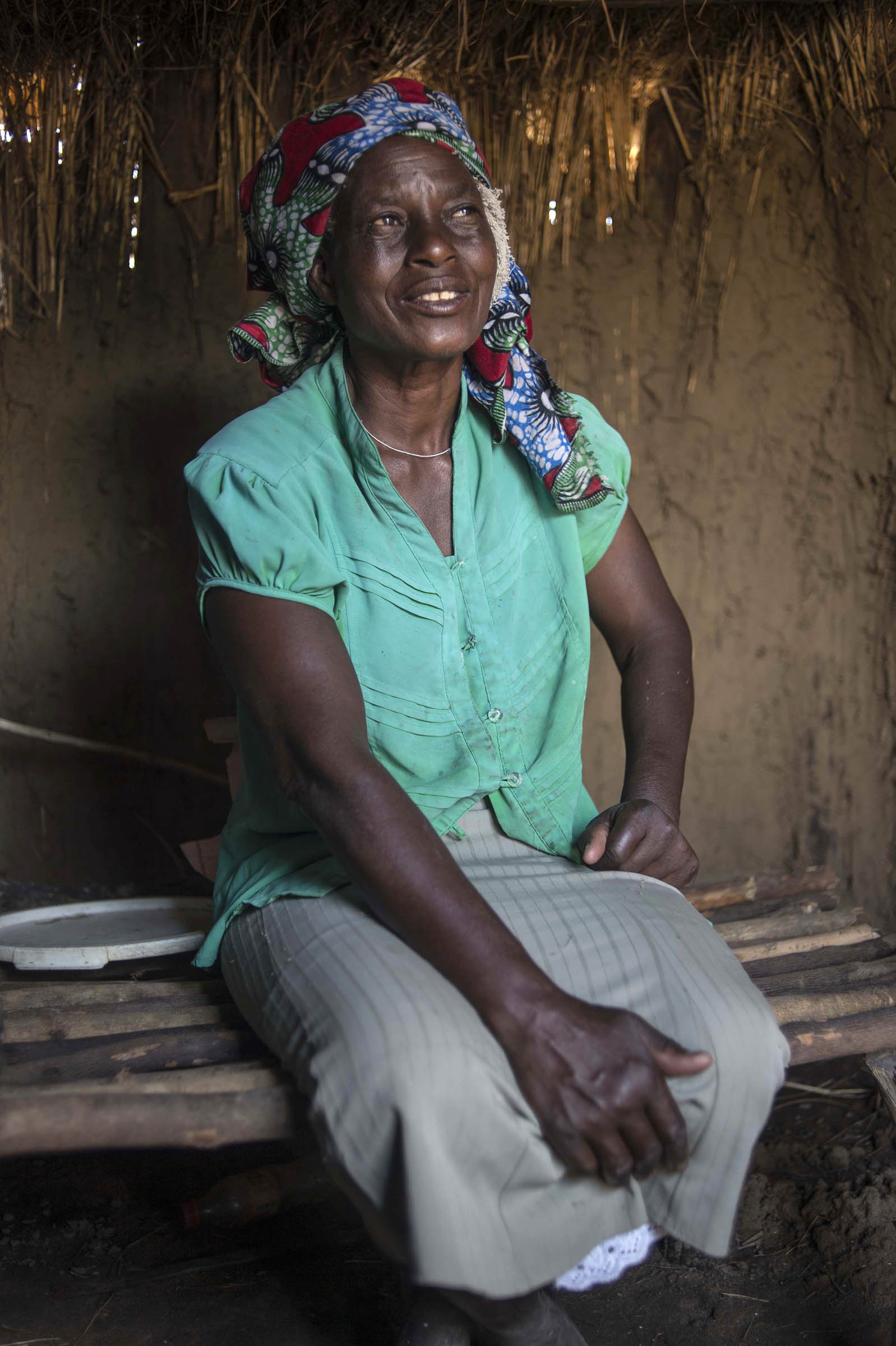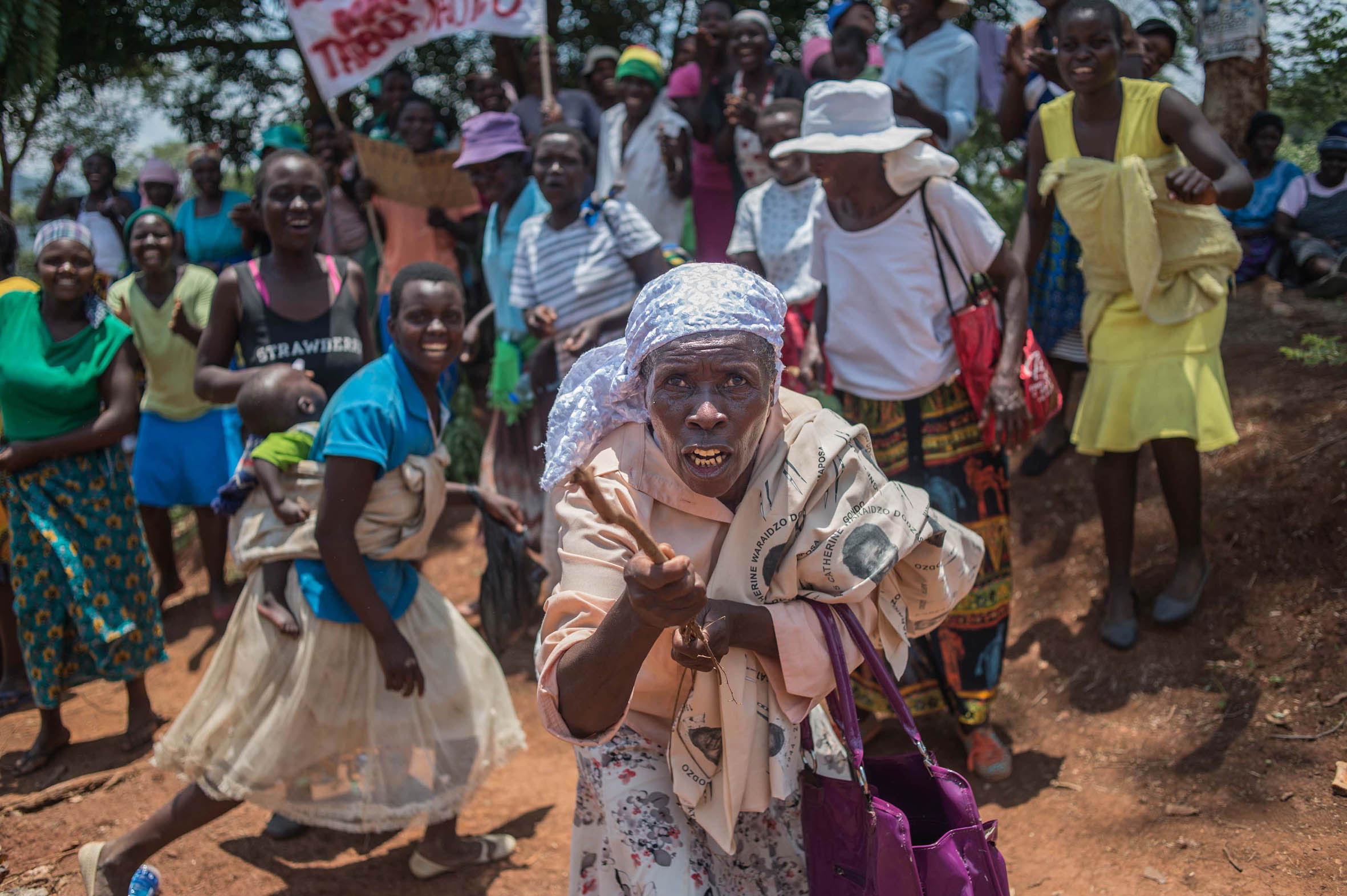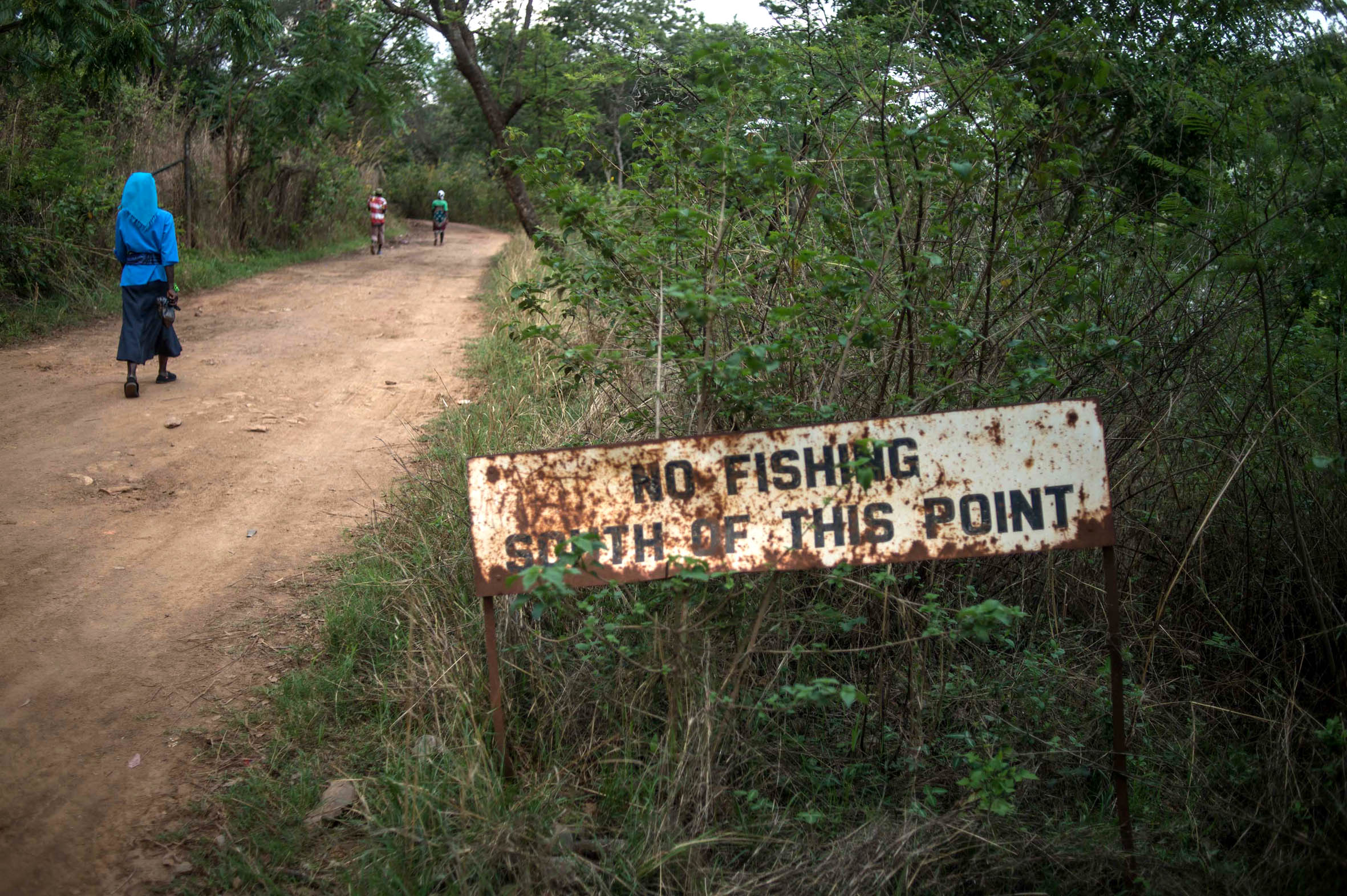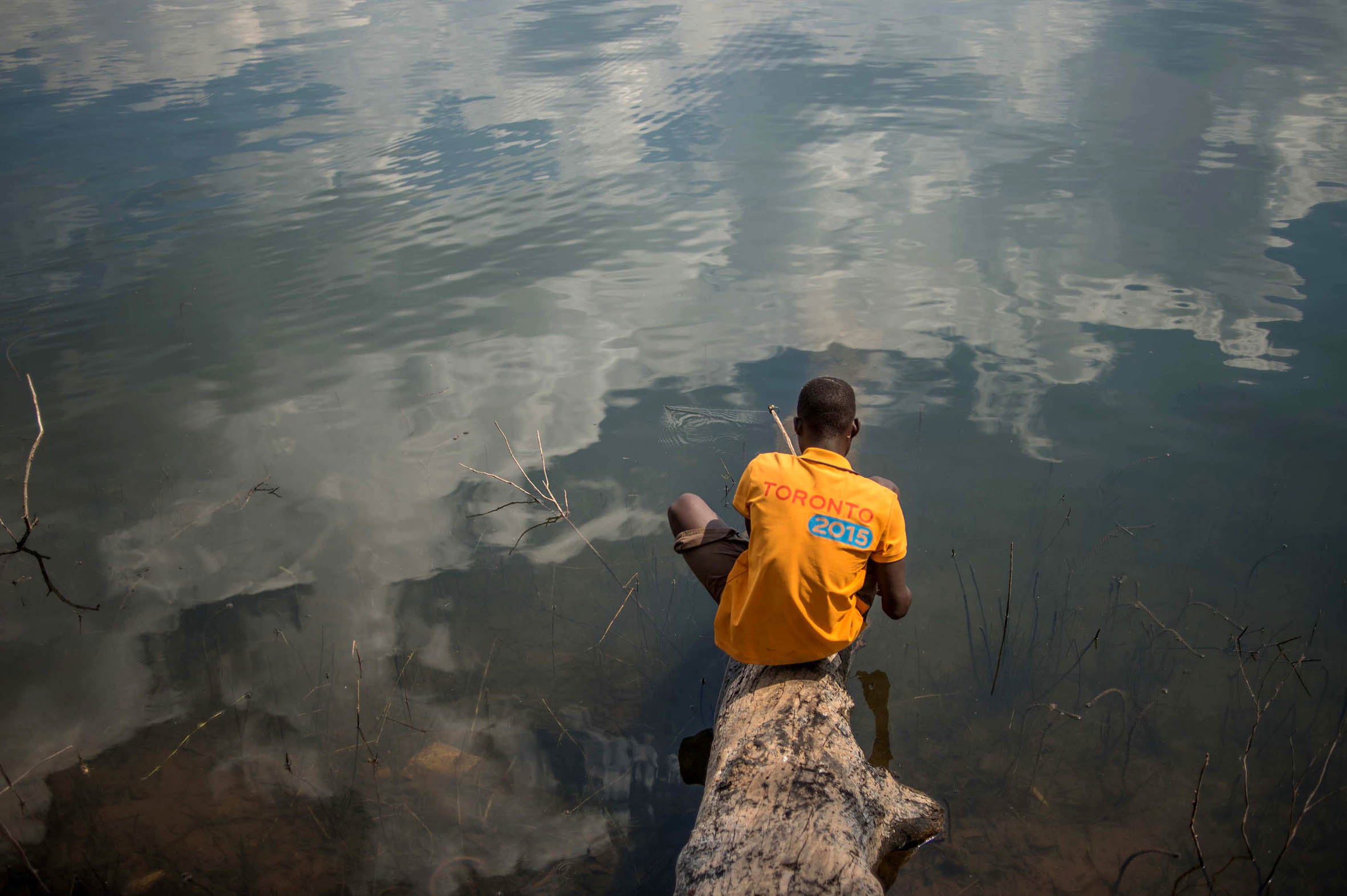Gracelands: People celebrate along the Mazowe road the downfall of the Mugabe couple.
Today the sky seems to be tearing at itself as the rumbles and barks threaten rain above Mazowe, 40km north of Harare.
Here at Manzou Farm at an elevation of nearly 1 500m the earth is rich and red, and freshly upturned clods break underfoot where a slight woman is tilling her field.
It has taken her nearly two years to plough this hectare of land, years in which police have come repeatedly to destroy her mud-and-thatch home, grab her chickens, trample her crops and manhandle her to the ground.

[Florence Gurure was a liberation fighter and moved on to Manzou Farm when war veterans took over white-owned farms in 2000. But then Grace took the land and people were herded on to trucks and dumped. (Mujahid Safodien)]
But Florence Gurure is a fighter. She fought for this land, first as a 14-year-old, when she was known as Mabhunu Muchatiza — the whites will run away.
“Welcome to Gracelands,” says Colen Zengeni.
Manzou Farm, which stretches for 20km in one direction, is only one part of the personal empire of “Amai” Grace Mugabe.
Gracelands, in this lush, idyllic stretch of countryside, includes the Mazowe Citrus Estate, Mapfeni Farm, the state-of-the-art Alpha and Omega Dairy Farm and the 7 720m2 Grace Mugabe Junior School and orphanage, where the 24-pupils-per-class is a far cry from the packed and chronically under-resourced government schools throughout Zimbabwe.
Gurure was at a war veterans’ meeting this week. They have been meeting more regularly these past two weeks, leaning in close to radios and discussing the rapidly unfolding events in their country. Then came the news that Robert Gabriel Mugabe had resigned as president.
“I was so happy. Happy because he promised us many things, but this is not our life,” she says. Like so many others in and around the capital, she believes the former president had invested much of his power in his wife. “But I do not blame Grace. It was his decision.”
A few kilometres along the road from Manzou Farm, Gurure’s neighbours are celebrating along the tarred Mazowe road — “otherwise people don’t see us”, they explain.
They have banners declaring November 18, the day the army took control of the country, as Independence Day.
A group of villagers from the Mount Darwin area had heeded the call by Mugabe and the war veterans to occupy white-owned farms in 2000 and converged on Manzou Farm.

[New Dawn: People celebrate Robert Mugabe’s presidency and the ousting of the Mugabe dynasty (Mujahid Safodien)]
“What brought us together is that we were poor and had no future. We were landless in our own country,” Violet Mazvarira (57) says.
“In 2000, we had hope because we had the land. We thought our problems had come to an end. But they never kept their promises,” Mazvarira says. Mugabe had promised to support the new farmers with seeds, equipment and other agricultural support. In the ensuing years, people survived on subsistence farming and fishing in the adjoining Mazowe Dam.
And then Grace announced the land was hers. The occupants of Manzou Farm were rounded up and herded on to trucks and dumped on a different farm a few kilometres down the road.
Earlier this year, as the small-scale farmers were preparing to reap their harvests, the police arrived. They drove herds of cattle that trampled everything underfoot and their mud-and-thatch homes were destroyed with rifle butts and boot heels, with the mounds of rubble still dotted around Manzou.
“She didn’t visit the farm. Not once,” says headman Enoch Kanakembizi.

[No fishing: The people at Manzou Farm supplemented their food with fish they caught in Mazowe Dam – until Grace Mugabe took over the land. (Mujahid Safodien)]
As they had done time and again, they returned to their demolished homes and endured the jackboots of the police, determined to claim their land. And, as had become practice with so many other Mugabe properties, the feared police support unit was deployed to control access to the farm.
In June, Grace expanded her empire and took control of the Mazowe Dam, a national resource not allowed by law to be privately owned, unless authorised by the president. Signs along the paths to the dam warn locals that fishing is not allowed. On an embankment overlooking the dam’s bank is a police outpost.
“No one was allowed to even catch fish. We were left to scratch in the ground for something to eat,” Zengeni says.
Along the Mazowe road the protesters cheer at the passing, hooting motorists.
“We do not have freedom yet but there is a chance,” Mazvarira says.
Zengeni, reflecting on his former president, says: “He wasn’t a bad man. But his wife …”
It is a sentiment common on the streets of Harare where, on Tuesday evening, after the news filtered through that Mugabe had resigned, the party carried on well into the night, with the revellers eventually converging at Africa Unity Square, next to the Parliament building.
“If it wasn’t for Grace, we wouldn’t be in this shit. All along we expected better but since she came into Mugabe’s life she created trouble for our country,” says Lucy Mashumba.
Pent-up emotions spilled on to the streets of the capital and, although most were loath to blame their president for the failures of their country, they insulted the former first lady instead.
“To be honest, I thank her. Were it not for her, Mugabe would have remained till today. She stepped on everyone’s toes,” says trader Thulani Mangena.
Hands stretched out to touch the liberators, the men in uniform who had awoken the slumbering nation from their nightmare. The young Zimbabwe Defence Force soldiers reached down from their armoured vehicles, accepting the plaudits of the grateful masses.
In the early hours of Wednesday morning, all that remained amid scattered bottles and rubbish were the armoured military vehicles.
At Manzou Farm, cupped between mountains covered in dense bush and trees, with smoke pouring out of her hut that acts as a kitchen, Gurure reflects on her own journey.

[Baptism of fire: ‘I am going to swim from one side of the dam right to the other side. There, far,’ (Mujahid Safodien)]
She was 14 years old when she left home and made her way to Mozambique to join the armed wing of Mugabe’s Zimbabwe African National Union, the Zimbabwe African National Liberation Army.
“We are the owners of this land. We fought for it. Whoever comes next must fulfil the promises. This is the third Chimurenga,” she says.
She recalls the promise that liberation held — access to food, education and land — and how it was betrayed by corrupt politicians. “What we were promised is not what happened.”
Today Gurure is married and has four children. Her husband lives with his two other wives, near Mount Darwin. He visits occasionally for a few days at a time. “He comes, he does nothing, he goes back.”
For Gurure, her fate is intrinsically tied to the land. “There is nothing that gives life other than the land.
“I have a feeling that our lives will improve. They will see that what has happened to Mugabe will happen to them as well.”
Walking past the unmanned guardhouse and the silent compound that housed AK-47-wielding police, the inhabitants of Manzou Farm stroll down the tree-lined grove.
“I am going to swim from one side of the dam right to the other side. There, far,” Zengeni said, to chuckles of delight from the group.
In the midst of the collapse of her family’s power during the past week, a recent picture of Grace shows a demure woman, dressed conservatively in a long skirt and blouse, unwilling or unable to face the lens. In the past seven days, the former first lady has left the Mugabe’s Borrowdale Brooke mansion only once. With an escort of three soldiers, she visited Mazowe briefly, before returning to her home beside State House and her nonagenarian husband’s side.